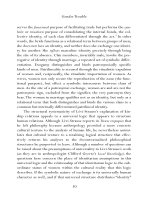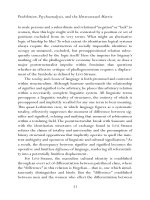GENDER TROUBLE 109
Bạn đang xem bản rút gọn của tài liệu. Xem và tải ngay bản đầy đủ của tài liệu tại đây (20.67 KB, 1 trang )
Gender Trouble
within the very structure of the self: “So by taking flight into the ego,
love escapes annihilation” (178). This identification is not simply
momentary or occasional, but becomes a new structure of identity; in
effect, the other becomes part of the ego through the permanent internalization of the other’s attributes.34 In cases in which an ambivalent
relationship is severed through loss, that ambivalence becomes internalized as a self-critical or self-debasing disposition in which the role of the
other is now occupied and directed by the ego itself: “The narcissistic
identification with the object then becomes a substitute for the erotic
cathexis, the result of which is that in spite of the conflict with the loved
person the love-relation need not be given up” (170). Later, Freud
makes clear that the process of internalizing and sustaining lost loves is
crucial to the formation of the ego and its “object-choice.”
In The Ego and the Id, Freud refers to this process of internalization
described in “Mourning and Melancholia” and remarks:
we succeeded in explaining the painful disorder of melancholia by
supposing that [in those suffering from it] an object which was lost
has been set up again inside the ego—that is, that an object-cathexis
has been replaced by an identification. At that time, however, we did
not appreciate the full significance of this process and did not know
how common and how typical it is. Since then we have come to
understand that this kind of substitution has a great share in determining the form taken by the ego and that it makes an essential contribution towards building up what is called its “character.” (18)
As this chapter on “The Ego and the Super-Ego (Ego-Ideal)” proceeds,
however, it is not merely “character” that is being described, but the
acquisition of gender identity as well. In claiming that “it may be that
this identification is the sole condition under which the id can give up
its objects,” Freud suggests that the internalizing strategy of melancholia does not oppose the work of mourning, but may be the only way in
which the ego can survive the loss of its essential emotional ties to others. Freud goes on to claim that “the character of the ego is a precipi74









